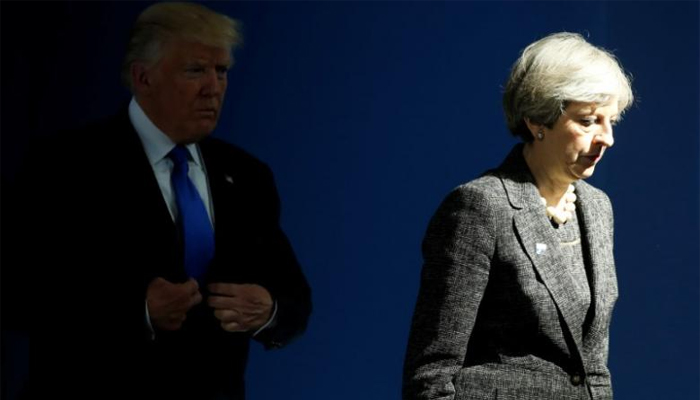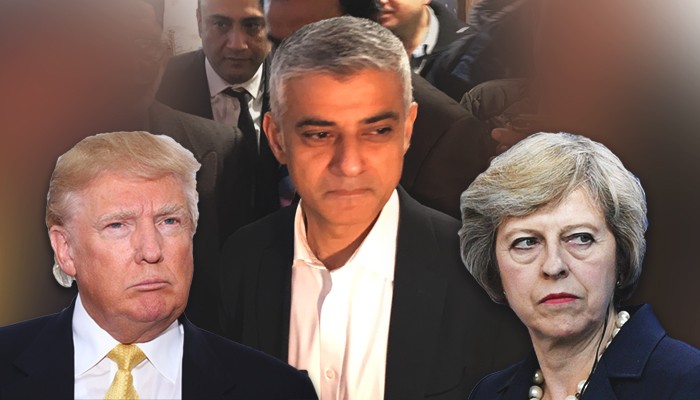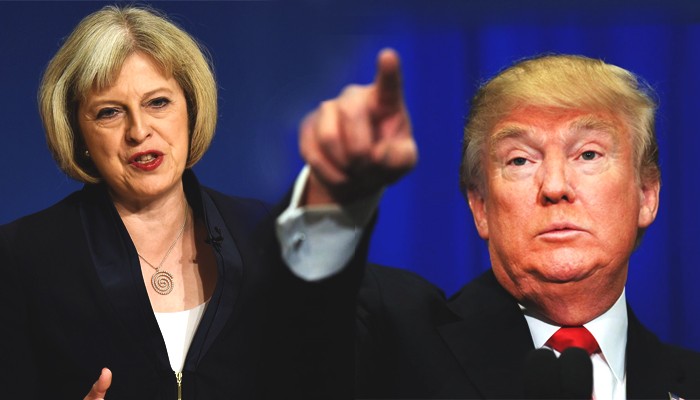Britain, US deny reports claiming Trump's state visit now postponed
June 12, 2017

Prime Minister Theresa May's office said on Sunday there had been no change to plans for US President Donald Trump's to come to Britain on a state visit after the Guardian newspaper reported the trip had been postponed.
The paper, citing an unidentified adviser at May's Downing Street office who was in the room at the time, reported Trump had told May by telephone in recent weeks that he did not want to come if there were likely to be large-scale protests.
"The statement surprised May, according to those present. The conversation in part explains why there has been little public discussion about a visit," says a part of the Guardian article.
"We aren’t going to comment on speculation about the contents of private phone conversations," a spokeswoman for May's office said. "The queen extended an invitation to President Trump to visit the UK and there is no change to those plans."
The White House also denied the Guardian report, with an administration official telling Reuters, "The subject never came up on the call."
No date has been set for the visit, which was agreed during May's visit to Washington in January, but British media had reported it was planned for October.
May's hold on power has been significantly weakened since the results of a snap election last week cost her Conservative Party a parliamentary majority. In a bid to save her position, May has been trying to form a government with Northern Ireland's Democratic Unionist Party (DUP), a small faction of social conservatives.
British politics is going through an upheaval just a week before talks begin on Britain's exit from the European Union (EU), set for 2019.
Public criticism by Trump earlier this month of London Mayor Sadiq Khan's response to the London terror attacks was condemned in Britain. May found herself forced to defend Khan, who is from the opposition Labour party.
Public criticism by Trump earlier this month of London Mayor Sadiq Khan's response to the London terror attacks was condemned in Britain. May found herself forced to defend Khan, who is from the opposition Labour party.
Khan late last month said May should withdraw the state visit invitation to Trump over his extremely hostile views on Muslims and the immigrants.
In an exclusive interview with Geo News earlier, the mayor said Trump stands against the American and British values of tolerance, humanity, and goodwill. “There is no need to invite Donald Trump on a state visit. His policies on Muslims and refugees are dangerous for the world," Khan said.
The mayor had advised May to be courageous and tell Trump that the ban on Muslims and refugees is wrong. Rolling out the red carpet may send out "a worrying signal to the world", Khan stressed.
At that time, Foreign Secretary Boris Johnson said there was no reason to cancel the visit, while White House spokesman Sean Spicer said that Trump intended to go and that "he appreciates Her Majesty's gracious invitation".
More recently, however, the London mayor hit back at Trump after the latter's uncalled-for criticism, reiterating that the American president’s visit to Britain should be cancelled.
Speaking to Channel 4 News, Khan said Trump was had been wrong about “many things” and the government should cancel his state visit to the UK, which is expected in October.
After the June 5 London attacks, Donald Trump took to Twitter to criticise the mayor, blaming him for making excuses in the wake of continuous attacks in London.
Khan had said in one of his first statements in reaction to the attack that people would see an increased police presence on the streets of the capital and should not be alarmed by that, which Trump had taken out of context to criticise him.
Interestingly, a petition demanding Trump’s visit be cancelled – as it will be an embarrassment to the Queen of England – reached more than a million signatures in January.
The petition surged exponentially in popularity, passing the 100,000-signature necessary to have it considered in the Parliament. “At one point more than a thousand people [signed] each minute,” a British media outlet reported.















